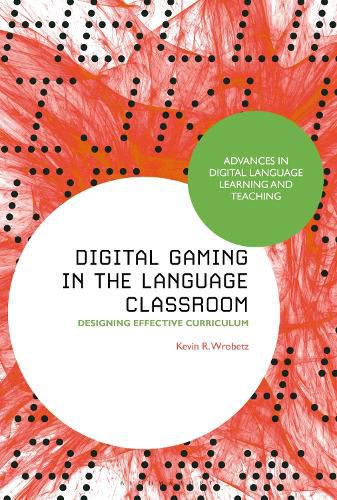Readings Newsletter
Become a Readings Member to make your shopping experience even easier.
Sign in or sign up for free!
You’re not far away from qualifying for FREE standard shipping within Australia
You’ve qualified for FREE standard shipping within Australia
The cart is loading…






This book examines how single-player role-playing digital games can promote foreign language acquisition and looks at how they can be integrated into the curricula of foreign language classrooms.
As the commercialization of digital games continues to expand and accelerate, some research in digital game-based learning has shifted from creating digital games with pedagogical applications to adopting commercial off-the-shelf digital games for pedagogical purposes. Relevant literature has continually identified massively multi-player online role-playing games (MMORPGs) as a specific genre which may benefit second language acquisition (SLA), primarily through a sociocultural perspective whereby language learners interact with linguistically more capable peers within the context of the game. However, there is a gap in research regarding whether these benefits to SLA are limited to social gameplay mechanics.
Wrobetz addresses this gap in research by using the smartphone edition of the single-player role-playing game (RGP) Life Is Strange in a mixed-methods study, measuring vocabulary acquisition and long-term retention from gameplay relative to controls. The author also examines how the perception of both smartphone gaming as a language-learning tool and the target language culture shifted throughout the study.
This volume helps guide future research in digital games-based language learning to broaden the scope of games identified as being conducive to SLA. It also outlines how to structure formal foreign language curricula around the use of a single-player RPG to achieve the most desirable pedagogical outcomes.
$9.00 standard shipping within Australia
FREE standard shipping within Australia for orders over $100.00
Express & International shipping calculated at checkout
Stock availability can be subject to change without notice. We recommend calling the shop or contacting our online team to check availability of low stock items. Please see our Shopping Online page for more details.
This book examines how single-player role-playing digital games can promote foreign language acquisition and looks at how they can be integrated into the curricula of foreign language classrooms.
As the commercialization of digital games continues to expand and accelerate, some research in digital game-based learning has shifted from creating digital games with pedagogical applications to adopting commercial off-the-shelf digital games for pedagogical purposes. Relevant literature has continually identified massively multi-player online role-playing games (MMORPGs) as a specific genre which may benefit second language acquisition (SLA), primarily through a sociocultural perspective whereby language learners interact with linguistically more capable peers within the context of the game. However, there is a gap in research regarding whether these benefits to SLA are limited to social gameplay mechanics.
Wrobetz addresses this gap in research by using the smartphone edition of the single-player role-playing game (RGP) Life Is Strange in a mixed-methods study, measuring vocabulary acquisition and long-term retention from gameplay relative to controls. The author also examines how the perception of both smartphone gaming as a language-learning tool and the target language culture shifted throughout the study.
This volume helps guide future research in digital games-based language learning to broaden the scope of games identified as being conducive to SLA. It also outlines how to structure formal foreign language curricula around the use of a single-player RPG to achieve the most desirable pedagogical outcomes.